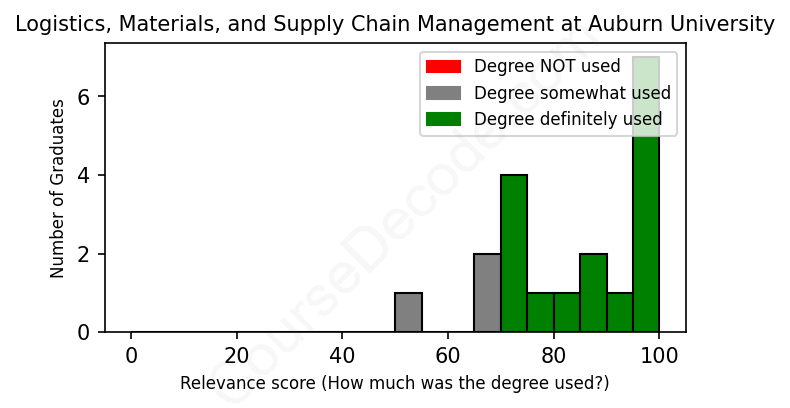
First, some facts. Of the Logistics, Materials, and Supply Chain Management graduates from Auburn University we've analyzed , here's how many have used (or NOT used) their degree in their career:

These are estimates based on AI analysis of 19 LinkedIn profiles (see below).
The verdict? Significantly above average. Overall, with an average relevance score of 83%, Logistics, Materials, and Supply Chain Management graduates from Auburn University have a much higher likelihood (+16%) of finding work in this field compared to the average graduate across all fields:
And for comparison, here's the chart for all profiles we've looked at across all degrees.
Also, after graduating, only 5% of these graduates have pursued further education other than another Bachelor's degree (such as a Masters degree or other), compared to the average across all profiles of 35%. This suggests a Bachelors degree is enough for most Logistics, Materials, and Supply Chain Management graduates, and it's normal to look for work straight after graduation.
See the details:
|
Relevance score: 100% We think this person has gone into a career highly relevant to their degree. We think this person has gone into a career highly relevant to their degree.
DEGREE INFOGraduated in 2021 from Auburn University with a Bachelor's degree in Logistics, Materials, and Supply Chain Management. No other secondary education since. JOB HISTORY SINCE GRADUATIONProduction Coordinator and Buyer I-PEX Oct 2021 - Sep 2022 Data Analyst - Demand Planner  Missouri Star Quilt Company Sep 2022 - Present ABOUTI am a finance-savvy supply chain management professional with extensive experience in data analysis, manufacturing, and cross-functional team collaboration. I am known for my ability to work effectively with all levels of management and my proven track record of resolving technical issues with precision and efficiency. In addition to my technical skills, I have a deep understanding of how to motivate and inspire people, and I pride myself on my exceptional interpersonal skills. As a detail-oriented and results-driven individual, I am committed to delivering excellence in all aspects of my work. I am eager to leverage my expertise in finance, supply chain management, and people skills to help your organization achieve its goals. |
The top 10 most common jobs done by the graduates we've analyzed (ranked most common to least) are:
Based on the job profiles of individuals who graduated from Auburn University with a degree in Logistics, Materials, and Supply Chain Management, it seems like most of them have gravitated towards roles connected to supply chain management, logistics, and procurement. Common job titles include Logistics Supervisor, Buyer, and various Consulting roles that heavily incorporate logistics principles. Many of these positions—like those at companies such as Amazon, IBM, and various logistics-focused firms—require a strong foundation in the skills and knowledge instilled during their studies. Roles directly connected to logistics and supply chain practices, like Logistics Managers and Analysts, show a clear trend of graduates applying their degree in relevant fields.
However, it's also evident that not every job has aligned perfectly with their major. Some graduates took on roles that didn't fully leverage their logistics training, such as in administration or human resources. In these cases, although they may have picked up some transferable skills, the core logistics and supply chain management competencies learned in college weren’t the primary focus. Overall, while many graduates have successfully transitioned into relevant positions, a few have ventured into roles where their degree knowledge doesn’t play a significant part. Still, the majority have been able to find opportunities directly linked to their studies, showcasing the versatility and demand for logistics expertise in today's job market.
Here is a visual representation of the most common words in job titles for Logistics, Materials, and Supply Chain Management graduates (this is across all Logistics, Materials, and Supply Chain Management graduates we've analyzed, not just those who went to Auburn University):

Graduates from Auburn University's Logistics, Materials, and Supply Chain Management program seem to be starting on solid career paths that stay relevant to their degrees. For many, their first jobs after graduation typically involve roles like buyers, logistics coordinators, or sourcing specialists. This kind of entry-level experience allows them to quickly get their foot in the door of the supply chain sector, where they gain valuable industry insights and practical skills. Over the years, a large number of these alumni transition into more advanced positions such as consultants, managers, or analysts, often with a focus on improving operations and efficiency within their organizations.
As we look at their career trajectories five to ten years post-graduation, many of these individuals seem to climb the ranks effectively. They often move from entry-level roles into management positions or consulting, indicating both growth within their companies and higher industry demand for their skill set. There's a strong trend of graduates moving into roles with reputable firms like IBM, Amazon, and Capgemini, or even significant roles in the military and governmental agencies, highlighting the versatility and relevance of their degrees. Overall, it appears that a degree in Logistics, Materials, and Supply Chain Management from Auburn University sets graduates up for a range of promising and relevant career opportunities.
Honestly, a Bachelor’s degree in Logistics, Materials, and Supply Chain Management can be a bit of a mixed bag, but it’s generally not considered the hardest degree out there. At Auburn or elsewhere, you’ll dive into courses that cover everything from operations management to inventory systems, and while some of the math and analytical stuff can get tricky, it’s usually manageable with some effort. If you’re organized and good with problem-solving, you’ll probably find it easier than, say, engineering or a tough science major. Overall, if you're interested in the subject and willing to put in the work, it won’t be too bad!
Most commonly, in the LinkedIn profiles we've looked at, it takes people 4 years to finish a Bachelor degree in Logistics, Materials, and Supply Chain Management.
So, looking at these Auburn University graduates, it seems like most of them have landed pretty solid jobs and likely make decent money, especially considering the roles they've taken on. Many of them have climbed up the ladder in their fields, moving from entry-level positions to managerial roles or consulting gigs, which usually come with better paychecks over time. For instance, those working at major companies like Southern Company, IBM, and the U.S. Department of Defense often see good salaries and benefits. Plus, it seems like several have stayed put for a decent amount of time in their roles, which is a sign of stability and potentially good financial returns. However, a couple of profiles, especially those just entering the workforce, might be starting out at the lower end of the pay scale, but overall, it looks like they’re on a promising path to earning well in their chosen paths!
Here is a visual representation of the most common words seen in the "about" section of LinkedIn profiles who have a Bachelor degree in Logistics, Materials, and Supply Chain Management (this is across all Logistics, Materials, and Supply Chain Management graduates we've analyzed, not just those who went to Auburn University). This may or may not be useful:

Here are all colleges offering a Bachelor degree in Logistics, Materials, and Supply Chain Management (ordered by the average relevance score of their Logistics, Materials, and Supply Chain Management graduates, best to worst) where we have analyzed at least 10 of their graduates:
| College | Score | Count |
|---|---|---|
 Michigan State University Michigan State University
|
84 | 23 |
 Auburn University Auburn University
|
83 | 19 |
 Ashford University Ashford University
|
82 | 12 |
 University of Wisconsin-Milwaukee University of Wisconsin-Milwaukee
|
81 | 10 |
 Rutgers Business School Rutgers Business School
|
79 | 24 |
 Penn State University Penn State University
|
78 | 21 |
 Embry-Riddle Aeronautical University Embry-Riddle Aeronautical University
|
78 | 10 |
 Arizona State University - W. P. Carey School of Business Arizona State University - W. P. Carey School of Business
|
78 | 14 |
 Iowa State University Iowa State University
|
77 | 14 |
 University of Houston University of Houston
|
76 | 30 |
 University of Arkansas University of Arkansas
|
76 | 18 |
 University of Tennessee, Knoxville University of Tennessee, Knoxville
|
75 | 15 |
 University of North Texas University of North Texas
|
69 | 14 |
 Texas A&M University Texas A&M University
|
67 | 27 |
 Georgia Southern University Georgia Southern University
|
62 | 13 |
 The Ohio State University The Ohio State University
|
60 | 10 |
 University of Houston-Downtown University of Houston-Downtown
|
57 | 13 |